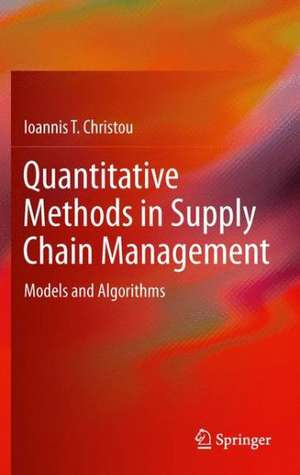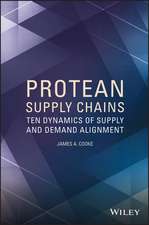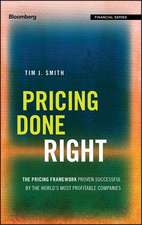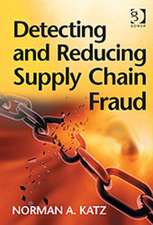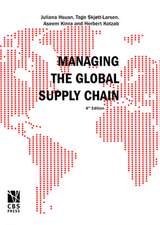Quantitative Methods in Supply Chain Management: Models and Algorithms
Autor Ioannis T. Christouen Limba Engleză Paperback – 29 noi 2013
The first chapter is an extensive optimization review covering continuous unconstrained and constrained linear and nonlinear optimization algorithms, as well as dynamic programming and discrete optimization exact methods and heuristics. The second chapter presents time-series forecasting methods together with prediction market techniques for demand forecasting of new products and services. The third chapter details models and algorithms for planning and scheduling with an emphasis on production planning and personnel scheduling. The fourth chapter presents deterministic and stochastic models for inventory control with a detailed analysis on periodic review systems and algorithmic development for optimal control of such systems. The fifth chapter discusses models and algorithms for location/allocation problems arising in supply chain management, and transportation problems arising in distribution management in particular, such as the vehicle routing problem and others. The sixth and final chapter presents a short list of new trends in supply chain management with a discussion of the related challenges that each new trend might bring along in the immediate to near future.
Overall, Quantitative Methods in Supply Chain Management may be of particular interest to students and researchers in the fields of supply chain management, operations management, operations research, industrial engineering, and computer science.
| Toate formatele și edițiile | Preț | Express |
|---|---|---|
| Paperback (1) | 950.03 lei 43-57 zile | |
| SPRINGER LONDON – 29 noi 2013 | 950.03 lei 43-57 zile | |
| Hardback (1) | 953.65 lei 43-57 zile | |
| SPRINGER LONDON – 5 oct 2011 | 953.65 lei 43-57 zile |
Preț: 950.03 lei
Preț vechi: 1158.57 lei
-18% Nou
Puncte Express: 1425
Preț estimativ în valută:
181.79€ • 190.28$ • 151.31£
181.79€ • 190.28$ • 151.31£
Carte tipărită la comandă
Livrare economică 31 martie-14 aprilie
Preluare comenzi: 021 569.72.76
Specificații
ISBN-13: 9781447160380
ISBN-10: 144716038X
Pagini: 412
Ilustrații: XIV, 398 p.
Dimensiuni: 155 x 235 x 22 mm
Greutate: 0.58 kg
Ediția:2012
Editura: SPRINGER LONDON
Colecția Springer
Locul publicării:London, United Kingdom
ISBN-10: 144716038X
Pagini: 412
Ilustrații: XIV, 398 p.
Dimensiuni: 155 x 235 x 22 mm
Greutate: 0.58 kg
Ediția:2012
Editura: SPRINGER LONDON
Colecția Springer
Locul publicării:London, United Kingdom
Public țintă
ResearchCuprins
1. A Review of Optimization Methods.- 2. Forecasting.- 3. Planning and Scheduling.- 4. Inventory Control.- 5. Location Theory and Distribution Management.- 6. Epilogue.
Recenzii
From the reviews:
“This work useful as a textbook to teach subjects related to resolving practical problems in supply chain management at a master’s level. … the exercises are excellent vehicles for teaching graduate and PhD students. … Christou’s book is a good reference for researchers and operations research and operations management students who wish to gain a global view of supply chain management using mathematical procedures. Thus, it would be extremely helpful in introducing new students to supply chain management models.” (Javier Faulin, Interfaces, Vol. 43 (2), March-April, 2013)
“This work useful as a textbook to teach subjects related to resolving practical problems in supply chain management at a master’s level. … the exercises are excellent vehicles for teaching graduate and PhD students. … Christou’s book is a good reference for researchers and operations research and operations management students who wish to gain a global view of supply chain management using mathematical procedures. Thus, it would be extremely helpful in introducing new students to supply chain management models.” (Javier Faulin, Interfaces, Vol. 43 (2), March-April, 2013)
Notă biografică
Dr. Ioannis T. Christou holds a Dipl. Ing. Degree in Electrical Engineering from the National Technical University of Athens, Greece, an MBA degree from Athens University of Economics Business and the National Technical University of Athens, and an M.Sc. and Ph.D. in Computer Sciences from the University of Wisconsin at Madison, Madison, WI, USA. He has held senior posts at TransQuest Inc., and Delta Technology Inc., has been an MTS at Lucent Technologies Bell Labs, USA, and an area leader in Data and Knowledge Engineering at Intracom S.A., Greece. He has been a consultant for various private and public sector companies in Greece on a variety of business intelligence and SCM and IT related issues, and has developed large-scale MIS systems for ΔΕΗ S.A. (Greek public electricity utility company), 3-E S.A., Velti S.A., GAP S.A., and others. He developed the LOTO bid-line generation system for Delta Air Lines, and the fraud-detection system for lotteries and online games of chance for Intralot S.A. He has taught Software Engineering and Computer Programming Laboratory as an adjunct assistant professor at the Computer Engineering and Informatics Department of the University of Patras, Greece; Production Systems at the Production and Management Engineering Department of the Democritus University of Thrace, Greece; Business Management for Engineers and Information Systems Modeling at the Information Networking Institute of Carnegie-Mellon University, Pittsburgh, PA, USA; and Modern Methods for Network Optimization at the Doctorate School of Aalborg University, Aalborg, Denmark. Dr. Christou is currently an associate professor at Athens Information Technology, Athens, Greece, where he teaches graduate-level courses on systems analysis and design, logistics and supply chain management, and network optimization. He is also an adjunct professor at Carnegie-Mellon University, Pittsburgh, PA, USA. His research work has appeared in IEEE Transactions on PatternAnalysis and Machine Intelligence, Mathematical Programming, Interfaces, Journal of Global Optimization, International Journal of Production Research, Production Planning and Control, International Journal of Systems Science, Computers and Operations Research, and other high impact factor journals and conferences.
Textul de pe ultima copertă
Quantitative Methods in Supply Chain Management presents some of the most important methods and tools available for modeling and solving problems arising in the context of supply chain management. In the context of this book, “solving problems” usually means designing efficient algorithms for obtaining high-quality solutions.
The first chapter is an extensive optimization review covering continuous unconstrained and constrained linear and nonlinear optimization algorithms, as well as dynamic programming and discrete optimization exact methods and heuristics. The second chapter presents time-series forecasting methods together with prediction market techniques for demand forecasting of new products and services. The third chapter details models and algorithms for planning and scheduling with an emphasis on production planning and personnel scheduling. The fourth chapter presents deterministic and stochastic models for inventory control with a detailed analysis on periodic review systems and algorithmic development for optimal control of such systems. The fifth chapter discusses models and algorithms for location/allocation problems arising in supply chain management, and transportation problems arising in distribution management in particular, such as the vehicle routing problem and others. The sixth and final chapter presents a short list of new trends in supply chain management with a discussion of the related challenges that each new trend might bring along in the immediate to near future.
Overall, Quantitative Methods in Supply Chain Management may be of particular interest to students and researchers in the fields of supply chain management, operations management, operations research, industrial engineering, and computer science.
The first chapter is an extensive optimization review covering continuous unconstrained and constrained linear and nonlinear optimization algorithms, as well as dynamic programming and discrete optimization exact methods and heuristics. The second chapter presents time-series forecasting methods together with prediction market techniques for demand forecasting of new products and services. The third chapter details models and algorithms for planning and scheduling with an emphasis on production planning and personnel scheduling. The fourth chapter presents deterministic and stochastic models for inventory control with a detailed analysis on periodic review systems and algorithmic development for optimal control of such systems. The fifth chapter discusses models and algorithms for location/allocation problems arising in supply chain management, and transportation problems arising in distribution management in particular, such as the vehicle routing problem and others. The sixth and final chapter presents a short list of new trends in supply chain management with a discussion of the related challenges that each new trend might bring along in the immediate to near future.
Overall, Quantitative Methods in Supply Chain Management may be of particular interest to students and researchers in the fields of supply chain management, operations management, operations research, industrial engineering, and computer science.
Caracteristici
Provides the results of research from the last 6-12 months, which has not yet been published in book form Offers experience in dealing with advanced algorithms for some of the most challenging problems in supply chain design and management Includes a number of case studies Includes supplementary material: sn.pub/extras
